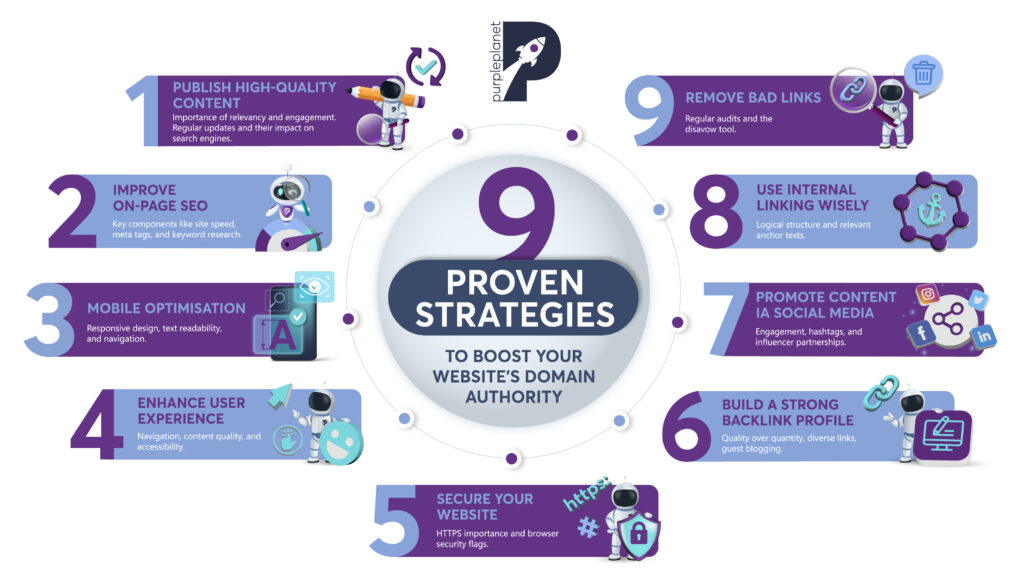

9 Strategies to Increase Website Domain Authority
What is domain authority?
For website owners and digital marketers, domain authority is a helpful indicator of where their website sits against their competitors’ sites.
The metric of domain authority was originally developed by Moz as a score on a 100-point scale that predicts how well a website will rank in the SERPs. Subsequently, tools such as Ahrefs and SEMrush created their own versions of the metric, called Domain Rating and Authority Score respectively.
Though domain authority is not used by Google in determining search engine rankings, it is a useful way of placing SEO best practices at the centre of strategies. This is because of the known factors that influence these scores on the tools mentioned above – we can use these to inspire SEO strategies.
In the SEO community, the term ‘domain authority’ has become independent of tools like Moz, Ahrefs, and SEMrush. However, you do need to be using one of these tools if you want a quantifiable score. Plus, these tools can tell you the domain authority of your competitors.
If you want to improve your domain authority without using one of these tools, your pursuit will be slippery. Without a quantifiable figure, you won’t be able to prove your efforts have led to an increased domain authority score. However, following the tips mentioned in this article will improve your site’s SEO – so it’s not essential that you subscribe to one of these tools.
Let’s dive in and learn more about domain authority:
Why is domain authority so important?
In the digital marketplace, visibility is key. A higher domain authority indicates a greater likelihood of appearing at the top of search results, leading to more organic traffic. This traffic isn’t just a number – it represents real potential customers. Having a high domain authority is akin to having a prime location in the physical world – it’s where the most foot traffic is.
To keep things simple, domain authority is important because of the following factors:
- Higher domain authority gives sites a better chance of ranking well in the SERPs.
- Domain authority is a useful metric for competitive analysis.
- Domain authority is a measurable indicator of your SEO strategy’s efficacy.
- High domain authority can increase your site’s perceived credibility and trustworthiness.
- Sites with high domain authority attract backlinks from reputable websites.
- Domain authority can guide your content strategy.
- High domain authority correlates with increased organic traffic.
- Sites with high domain authority will attract advertisers.
- High domain authority over time will contribute to your site’s overall long-term success.
Domain authority can become an indispensable metric in your digital toolbox, guiding you through all your optimisation efforts. Understanding and improving it unlocks your website’s potential for increased visibility, higher traffic, and ultimately, more successful business outcomes.
So, what else is there to understand about domain authority?
What factors influence your website’s domain authority?
Understanding the factors that shape your website’s domain authority is the first crucial step in mastering it. The following aspects should be considered if your strategy is to succeed:
- Quantity and quality of external links pointing to your website (its backlink profile).
- The number of unique domains linking to your site.
- Quality (relevance, uniqueness, and engagement) of site content.
- Use of keywords and meta tags (SEO).
- Website structure (hierarchy and navigation).
- Social signals.
- Mobile performance.
- Loading speed.
- Domain age.
- User experience.
To give you a clearer idea of how these influential factors can be mastered for your strategy, we’ve created a list of 9 ways you can improve your domain authority:
9 strategies to increase website domain authority
1) Publish high-quality content and update it regularly
A cornerstone of strengthening your domain authority is to consistently publish high-quality content. Your site content needs to be relevant, providing substantial value that meets the needs and interests of your audience.
It should be engaging enough to hold visitors’ attention and encourage them to interact with your site, whether through comments, shares, or linking back to your content.
But creating great content is only part of the equation – regular updates are crucial. Search engines favour websites that are dynamic, with fresh content indicating that the site is active and offering the latest information. Regular updates signal to search engines that your website is a current source of knowledge or news in your industry, which can positively impact your domain authority.
Focusing on the quality, relevance, and freshness of your content, will increase the likelihood that you’ll earn natural backlinks, which are essential for boosting your domain authority.
There are certain types of content that are more likely to attract backlinks, but we’ll discuss those later. Remember that, in this case, quality is more important than quantity.
2) Improve on-page SEO
On-page SEO is fundamental in the quest to enhance domain authority. This part of your strategy needs to encompass several key components:
- Your site’s loading speed should be as quick as possible.
- Your headings and meta tags should be used appropriately and optimised.
- Keyword research should support your strategy.
- Your site’s architecture should be logical and easy to navigate (for both bots and human visitors).
Other on-page elements, such as internal linking, will be explored further in a later section.
3) Mobile optimisation
Mobile optimisation is no longer just an option – it’s imperative for improving domain authority.
Optimising your site for mobile means having a responsive design that displays well on smaller screens. Text should be readable without the need for zooming and navigation should be thumb-centred.
Don’t forget mobile page loading speed, as this can differ from your site’s desktop score. In addition, mobile optimisation is perhaps more crucial for local businesses as on-the-go users predominantly search for information on their mobiles.
4) Enhance user experience
User experience (UX) is a critical component of website success independently of domain authority. So, it should be central to your strategy.
UX puts a big emphasis on navigation – this means having a logical flow so that users find information intuitively and easily. Menus and search functions should be clear, or users can quickly tire.
Content is another significant part of the user’s experience, demanding that it be informative and engaging. Elements such as images, videos, and infographics can keep users interested and result in longer times being spent on your site.
User experience also considers accessibility, which you can learn how to optimise here.
5) Secure your website
Perhaps surprisingly, your website’s safety is an influential factor in the fate of its domain authority. Not only does it protect your users’ data, but it also indicates to search engines that your site can be trusted.
HTTPS is now a fundamental requirement for the protection of user data and a confirmed ranking signal. If you do not meet this requirement, browsers will flag your pages as ‘not secure,’ resulting in increased bounce rates and a weakened domain authority score.
Securing your site with HTTPS also means your site will perform better – a no-brainer in the eyes of user experience.
6) Build a strong backlink profile
A robust backlink profile is a highly coveted asset in the SEO world – and for good reason. Backlinks are one of the most pivotal factors in boosting domain authority. You can build a strong backlink profile by doing the following:
- Seek quality over quantity: high-quality backlinks from reputable and authoritative sites are far more beneficial than a large number of low-quality links.
- Aim for diverse links: backlinks from a variety of domains are better than multiple links from a single domain because they indicate widespread endorsement of your content.
- Attract links with content: link-worthy content includes original research, comprehensive guides, infographics, and insightful articles.
- Use guest blogging: contributing high-quality content to reputable sites in your industry can provide valuable backlinks and expose your brand to a larger audience.
- Reclaim lost links: monitor your backlinks and reach out to webmasters if links are removed or broken.
- Avoid link schemes: steer clear of dubious link farms and paid link schemes. This can lead to penalties from search engines and damage your domain authority.
- Regularly audit your backlinks: audits that assess the health of your backlink profile can help identify and reject toxic or spammy links.
- Network with industry leaders: building relationships with industry influencers can attract backlink opportunities.
Incorporating these considerations into your strategy can significantly strengthen your backlink profile and get you well on your way to an increase in domain authority.
7) Promote your content via social media
Social media promotion is a potent tactic for amplifying your content’s reach and increasing domain authority. This is because shares and visibility create opportunities for backlinks.
Rather than just posting content, be sure to engage with your followers. Responding to comments and having a dialogue with subscribers can build a community around your brand. While hashtags increase discoverability, a regular posting schedule will keep your audience engaged.
Partnering up with influencers can further increase visibility and opportunities for backlinks, but collaborations should always be relevant. Don’t forget to monitor your social media strategy and adjust it accordingly.
8) Use internal linking wisely
Internal linking is often overlooked and misunderstood. Unfortunately, that means many website owners miss out on its potential for boosting domain authority. Internal linking doesn’t have to be complicated or mystical:
Your internal linking structure should follow a logical hierarchy. There are several ways you can do it, but make sure it’s understandable by bots and human visitors alike. Balance is key because too many internal links can be harmful – this is known as ‘overlinking.’
Whatever internal linking structure you follow, it should connect your different pieces of content in a relevant way – helping visitors read and learn more. Think of internal linking as navigation – it should be intuitive.
The anchor text which contains the link should be relevant to the page it’s linking to. Plus, the pages you deem as ‘important’ should be linked to more often than less important pages.
Don’t forget to keep the whole site interconnected when you publish new content.
9) Remove bad links
Maintaining a clean backlink profile is as important as building one. You can manage it by doing the following:
- Conduct regular audits: use tools like Moz’s Link Explorer, Ahrefs, or Google Search Console to regularly audit your backlink profile.
- Identify bad links: look for links from spammy or irrelevant sites, as well as any links that violate Google’s Webmaster Guidelines.
- Reach out to webmasters: contact the webmasters of the sites with toxic links and request their removal.
- Use the disavow tool as a last resort: if you can’t get a harmful link removed, use Google’s Disavow Tool to ask Google not to consider those links when assessing your site.
The regular removal of bad links helps to preserve the integrity of your site, ensuring that your backlink profile remains strong and that it’s contributing positively to your domain authority.
Before starting your domain authority strategy
The above tips can have a powerful impact on your domain authority. However, there are several considerations to be made before embarking on such a strategy. You should know the following about domain authority:
- Domain authority improvements are not quick: a consistent effort must be sustained and financed over time.
- Domain authority should be viewed as a comparative tool: domain authority is about competitive analysis – not aiming for 100%. As a result, a moderate score might be enough. Some industries may not require a superbly high domain authority score and, therefore, some companies needn’t exhaust their resources.
- Domain authority is not a ranking factor: though the considerations that go into calculating domain authority resemble SEO best practices, it does not directly guarantee a ranking position.
- Domain authority is a by-product: instead of chasing a score on a costly tool, businesses should always focus on SEO as a whole.
- Strategies can be adapted: since smaller businesses may have limited resources, they should only attempt what they can afford to maintain. Over time, this will result in a sustainable strategy rather than a flash-in-the-pan success.
Though domain authority can be a useful indicator of a site’s potential, it should not be the sole focus of a website owner. In addition, businesses should consider their resources and capabilities before starting a new strategy. Ultimately, success in digital marketing is unique to each business. No one can create a template that works for everyone.
So, ensure your domain authority journey is relevant and achievable for your business.
Domain authority FAQs
There’s a lot more to say about domain authority. Here are our answers to the most commonly asked domain authority questions:
Is domain authority the same as page authority?
No. While domain authority gives a holistic view of an entire website’s potential to rank, page authority zooms in on the ranking strength of a single web page.
Its focus is more granular, evaluating the strength of individual pages based on factors like content quality, backlinks, and keywords.
Paying attention to the page authority of key pages can help with more targeted improvements, impacting your site’s performance in search results on a page-by-page basis.
How often does domain authority get updated?
Moz typically updates domain authority scores monthly, but it can vary.
Can a new website achieve a high domain authority quickly?
It’s challenging for new websites to quickly achieve high domain authority because factors like backlink accumulation and domain age take time to develop.
Does changing my website’s domain impact its domain authority?
Yes, changing a domain can impact domain authority, as it resets many of the metrics it’s based on, such as backlinks to the specific domain. In addition, search engines will need to re-index your site, which can reduce traffic for up to three months.
Can purchasing backlinks help increase my domain authority?
While purchasing backlinks might temporarily increase domain authority, it’s not recommended as it violates search engine guidelines and can lead to penalties.
How long does it take to see an improvement in domain authority?
Improvements in domain authority can take three to six months to become apparent, as building a quality backlink profile and other SEO improvements take time to influence the domain authority score.
Patience and consistency are key to domain authority strategies. Keep going, and it will pay off in the end.












